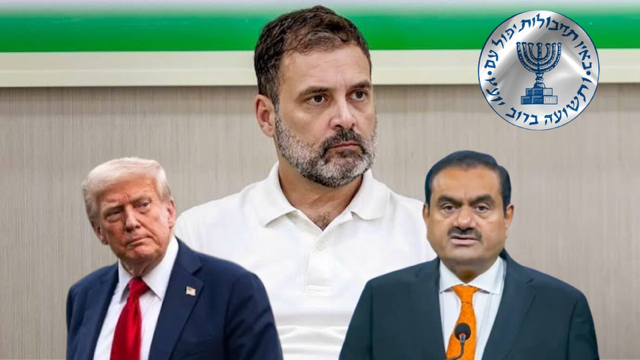In a deeply troubling move that raises grave questions about national loyalty and political opportunism, senior Congress leader Rahul Gandhi has once again provoked global powers against India. This time, the Gandhi scion targeted PM Modi by invoking the ongoing U.S. investigation into the Adani Group.
Days after Gandhi echoed former U.S. President Donald Trump’s baseless allegation that “the Indian economy is dead,” the Congress leader went a step further by tweeting: “India, please understand: The reason PM Modi cannot stand up to President Trump despite his repeated threats is the ongoing U.S. investigation into Adani. One threat is to expose the financial links between Modi, AA, and Russian oil deals. Modi’s hands are tied.”
India, please understand:
The reason PM Modi cannot stand up to President Trump despite his repeated threats is the ongoing U.S. investigation into Adani.
One threat is to expose the financial links between Modi, AA, and Russian oil deals.
Modi’s hands are tied.
— Rahul Gandhi (@RahulGandhi) August 6, 2025
This shocking attempt to draw a foreign power into India’s internal affairs is not new for Rahul Gandhi. However, this time, he appears to be inciting a former U.S. President to leverage a politically motivated investigation against a leading Indian business group to arm-twist the Indian government into submission. What else can explain his glee in aligning with anti-India narratives, even if it means compromising national interest?
Israeli intelligence had already exposed Rahul Gandhi’s alleged role in Adani hit job
This is not the first time Rahul Gandhi’s name has come up in connection with attacks on the Adani Group. According to an unverified but explosive report by Sputnik India, Israel’s intelligence agency Mossad uncovered a covert nexus between Rahul Gandhi, Sam Pitroda (head of Indian Overseas Congress), and U.S.-based short-seller Hindenburg Research.
Mossad reportedly hacked into Pitroda’s home servers and decrypted communications that pointed to an orchestrated campaign to use Hindenburg’s defamatory report against the Adani Group as a weapon to damage PM Modi and the Indian economy. Hindenburg’s 2023 report accused Adani Group of “pulling the largest con in corporate history”, allegations that were dismissed by the Indian Supreme Court in 2024.
The timing of the Hindenburg report also raised eyebrows, coming just days before Gautam Adani was to finalise a $1.2 billion deal to acquire the Haifa port in Israel. The Israeli government, viewing the report as a strategic attack, reportedly launched “Operation Zeppelin” to uncover the forces behind the smear campaign. Israeli sources found links to Chinese and Western lobbies, activist lawyers, hedge funds, and a “key face from India’s opposition dynasty.”
Soros-linked NGO network and Rahul Gandhi’s secret US visit
Adding fuel to the fire is Rahul Gandhi’s documented association with far-left and anti-India groups during his 2023 foreign tours. Notably, during a 10-day visit to the US, Gandhi met secretly with officials at the White House, a major breach of diplomatic protocol, as the trip was not coordinated through India’s Ministry of External Affairs.
At the Hudson Institute, Gandhi was seen seated beside Sunita Vishwanath, co-founder of “Hindus for Human Rights,” a Soros-funded outfit known for Hinduphobic rhetoric. George Soros himself has publicly called for regime change in India, and his Open Society Foundation has funded the Organised Crime and Corruption Reporting Project (OCCRP), which also published reports against the Adani Group.
Further, Rahul Gandhi’s trip to Uzbekistan overlapped with USAID administrator Samantha Power’s visit, an operative known for liaising with Soros-backed networks. These overlaps, coupled with Pitroda’s NGO Global Knowledge Initiative’s funding from USAID, the Rockefeller Foundation, and the U.S. State Department, raise critical questions about foreign collusion.
Political treason or just bad judgment?
While the Mossad revelations await official confirmation, the circumstantial evidence paints a troubling picture of Rahul Gandhi’s politics. From meeting Soros-linked activists to egging on foreign powers to act against Indian interests, Gandhi has repeatedly crossed red lines that no responsible opposition leader in a democracy should.
His latest tweet calling on Donald Trump to “expose” financial links between Modi, Adani, and Russian oil is not only unsubstantiated but comes dangerously close to inviting foreign interference in India’s domestic policy. It could also be seen as a backdoor attempt to undermine India’s geopolitical standing, economic confidence, and global partnerships — all for scripting a political comeback after losing countless state elections and three Lok Sabha polls on the trot.
Washington’s growing pressure on India and the Adani card
However, it is important to understand the broader context in which Rahul Gandhi made his remarks. The United States has been actively pressuring India to sign a half-baked trade deal that heavily favors American interests. When India pushed back, Washington responded with threats of imposing up to 25 per cent tariffs on Indian goods. More recently, this pressure escalated further, with the US accusing India of “funding Russia’s war machine”, a charge riddled with hypocrisy, given that both the US and EU continue to import billions worth of essential goods from Russia.
By invoking the Adani probe at such a moment, Gandhi seems to be encouraging American strong-arming of India using flimsy pretexts. If successful, this manoeuvre could open the door for an imbalanced trade deal that undermines India’s economic sovereignty.
Whose side is Rahul Gandhi on?
In democracies, opposition parties play a vital role in holding governments accountable. But when political ambition leads to aligning with foreign actors, promoting hostile narratives, and potentially compromising national interests, the line between dissent and betrayal blurs.
Rahul Gandhi’s history of courting foreign intervention, colluding with shady lobbies, and now provoking Donald Trump to act against India using the ‘Adani card’ begs a serious question: Is this the voice of an Indian politician, or the script of a foreign agent?

